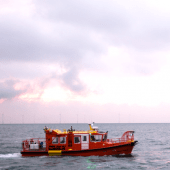ISHY

Implementation of Ship Hybridisation
Priority Axis
Low Carbon TechnologiesSpecific objective
Low Carbon Technologies
Lead partner
Autonoom Gemeentebedrijf Haven OostendeContact
Begindatum
01/02/2019Einddatum
31/03/2023Project budget
10 640 817 €ERDF amount
5 796 369 €ERDF rate
54%Over
Common challenge
Europe and the 2 Seas area are at risk of missing their 2020 carbon reduction targets according to current trajectories. The adoption of carbon and energy-saving propulsion systems by ports, vessel operators, and technology firms is crucial, but market and technology uncertainties impede progress. Key market failures include the extended operational lifetimes of vessels, providing little economic incentive for retrofitting or replacement. The affordability of fossil fuels, compared to alternatives like H2, dampens the incentive for a shift to low-carbon fuels. The low annual production of new ships diminishes the return on investment in innovation, while limited awareness, knowledge, and faith in alternative propulsion technologies persist.
Additional barriers include limited experience and understanding of H2 bunkering installations, coupled with an unclear regulatory framework for low-carbon technologies in vessels. Despite imminent EU rules for the sector, the absence of a policy for transitioning to low-carbon technologies complicates the situation.
To address these challenges, efforts should focus on demonstrating the effectiveness of low-carbon propulsion technologies, establishing H2 bunkering facilities, developing tools for transitioning, gaining support from authorities, and disseminating knowledge among stakeholders. Bridging the gap between time constraints and experiential learning is crucial for the widespread acceptance and implementation of low-carbon technologies.
Overall objective
Main outputs
Cross border approach
Main Achievements
The goal of ISHY was to develop, test and validate tools and methods for the implementation of hybrid and hydrogen fuel cell technologies in ships and Hydrogen bunkering facilities in ports and realize demonstrations to increase the adoption of these low-carbon technologies has succeeded.
The main pilot partners achievements consist of the development of a new multimode hybrid configuration (Hybrid Marine), the implementation of a new cruise vessel with hybrid propulsion of batteries and traditional fuel (Zilvermeeuw), the construction of a new 'plug and play' H2 fuel cell module (Zepp Solutions), and the creation of a H2 bunkering station for ships (Parkwind and Haven Oostende).
The main knowledge partners achievements consist of the development of a method to choose the optimal powertrain components, powers and technologies of a hybrid vessel to reduce CO2 emissions and a method to select the best energy management strategy given a boat configuration, the creation of a Toolbox (business cases & carbon saving potentials) for retrofit and new build vessels of low carbon propulsion technologies, the release of guidance relating to the safe use of gaseous and/or liquefied hydrogen based on the hazards identified, and the publication of an overall feasibility study through lab testing of the effects of changes in the hydrodynamic performance.
The tools, methods and test & monitoring results of the pilots demonstrated the feasibility of low-carbon fuel cell technologies in shipping and the potential for H2 bunkering stations. These results can also accelerate the adoption and application of green solutions. In addition, the pilots have shown what opportunities exist and to what extent they contribute to CO2 reduction. By sharing knowledge through workshops/demonstrations, conferences, websites, scientific articles and teaching materials, ISHY has contributed to stimulating green shipping in the 2 Seas area and the EU.
Testimonial

In the search for the introduction of new fuels in shipping, green hydrogen occupies an important place. Nevertheless, the technological integration of hydrogen use in various types of vessels is not fully developed. There is a need to test various prototypes. In addition, it is also important to provide for the development of bunkering systems for green hydrogen. Together we are investigating the possibility of building a bunkering station on a quay in the Port of Oostende that could serve as showcase for future hybridisation of vessels.
Jan Allaert, Commercieel Directeur - Port of Oostende
